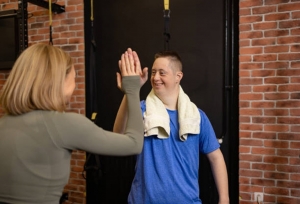Test Owner
The Public Services Committee has called on the government to implement several recommendations to improve support for young disabled people entering employment. Their report, Think Work First: The transition from education to work for young disabled people, outlines 36 recommendations, including increasing transparency on Access to Work wait times, providing better training for Disability Employment Advisors (DEAs), and expanding supported internships.
The report highlights the 30% disability employment gap, with young disabled people facing significant barriers from education through to employment. The inquiry found that low expectations and a lack of tailored support in schools and employment services contribute to these challenges. Good examples of careers education and workplace support exist, but they are not widespread enough and are often at risk of being discontinued.
The Committee emphasises the need for employers to feel confident hiring disabled workers and to ensure inclusive recruitment practices. They also stress the importance of changing attitudes, urging that aspiration and the belief that disabled people can thrive in work should be central to support.
Jon Sparkes, Chief Executive of Mencap, added that people with learning disabilities need more targeted support, such as accessible internships and employer training. He called on the government to invest in employment programmes that match the ambitions of disabled people, ensuring they receive the support needed to succeed in the workplace.
TV BRA, a Norwegian TV station where all reporters are disabled or autistic, is making waves with its unique approach to news broadcasting. Every week, the team produces a one-hour programme covering news, entertainment, and sport, which is aired on TV2 Play and their own platform. With around 5,000 weekly viewers, the show is presented in simple Norwegian and at a slower pace, making it more accessible to those with learning disabilities.
The station’s 10 reporters, including Emily Ann Riedel, who has Down's syndrome, work across Norway as local correspondents. They tackle a range of important issues, from community news to interviews with politicians. Riedel speaks of the professionalism required at the station, saying she has learned to balance her lively personality with the demands of delivering the news.
TV BRA also highlights stories of rights for disabled people, such as a recent report on a woman whose shopping assistance was threatened by local authorities. Although funding is tight, the team is motivated by a passion for improving understanding and representation of disabled people.
The station’s managing editor, Camilla Kvalheim, is proud of their progress, insisting that the team meet professional standards. TV BRA's work empowers both their reporters and viewers, making the news more accessible for people with learning disabilities across the country.
The Law Commission has launched a consultation aimed at reforming disabled children’s social care law to make it fairer, simpler, and more accessible for families. The current legal framework, which determines what support disabled children can receive from social services, is outdated and inconsistent, with some legislation dating back over 50 years. This has led to variations in support offered by local authorities and created unnecessary barriers for parents and carers seeking help for their children.
The consultation follows recommendations from the 2022 Independent Review of Children’s Social Care, which highlighted the difficulties families face in understanding and accessing support. The Law Commission is now seeking input from young people, families, social workers, local authorities, and anyone with knowledge of the area to guide its reform recommendations.
Professor Alison Young, Commissioner for Public Law, stressed the importance of modernising the law to reflect changing needs and improve clarity for families and service providers. The consultation will cover areas such as assessments, eligibility, service provision, transitioning to adult care, and the definition of disability.
Minister for Children and Families, Janet Daby, emphasised the need to remove outdated language and streamline the legal system, allowing social workers to focus more on improving the lives of vulnerable children and families, and ensuring disabled children receive the support they need.
A recent large-scale study has found that siblings of autistic children are seven times more likely to be diagnosed with autism themselves, a rate 20% higher than infants without autistic siblings. The US-led research, published by American Academy of Pediatrics (AAP), followed 1,605 infants with older autistic siblings across the US, Canada, and the UK, tracking their development from infancy to the age of three.
The study revealed that the likelihood of autism increases if a child has more than one autistic sibling, with a 37% chance of being diagnosed compared to 21% for those with just one autistic sibling. Boys were found to be almost twice as likely as girls to develop autism. Researchers also noted a higher recurrence rate in non-white families.
The findings mirrored previous studies and emphasised the need for close monitoring of siblings of autistic children, particularly in families with less access to care. Early intervention and diagnosis remain crucial, especially in families facing socio-economic challenges.
The study also highlighted educational disparities, with the recurrence rate decreasing as the mother’s education level increased. Researchers stressed the importance of further research into social determinants of health that may contribute to these trends but acknowledged that more work is needed to answer these complex questions.
Free NHS eyesight, hearing, and dental checks will soon be available to over 18,000 young people with special educational needs and disabilities (SEND) attending residential special schools and colleges across England. This initiative aims to ensure that any health issues are identified promptly, allowing children and young people to receive appropriate care and follow-up support quickly.
Research indicates that autistic children and those with learning disabilities are at a higher risk of developing eyesight, hearing, and dental problems compared to their peers. Additionally, they may struggle to communicate their difficulties, making early detection even more crucial. After successful pilot programmes in residential special schools during 2022 and 2023, the NHS will expand these sensory checks to all special residential schools and colleges next year.
The new programme will include a minimum of one annual face-to-face dental check, along with regular oral health advice to address concerns such as applying fluoride varnish and promoting effective toothbrushing. Hearing assessments will be conducted when children enter school and during key transitions, with referrals made to GPs or local audiology teams if any issues arise.
Tom Cahill, National Learning Disability and Autism Director at NHS England, emphasised the importance of these specialised checks in meeting the needs of vulnerable children in residential settings. He stated that tailored services delivered by trained staff will ensure these young individuals receive the same level of sensory checks that their peers do, ultimately addressing health inequalities and enhancing overall well-being.
Individuals who have faced challenges in securing employment due to mental health issues will soon receive valuable support aimed at facilitating their return to work. Workbridge, an initiative under the mental health charity St Andrew's Healthcare, has been granted £60,000 by West Northamptonshire Council, which is controlled by the Conservative party. This funding comes from the UK Shared Prosperity Fund and is part of a broader initiative designed to enhance local skills in Northampton.
The programme will focus on providing wellbeing support alongside essential skills training. Dr Inga Stewart, a consultant psychologist at St Andrew's, emphasised the collective responsibility to create supportive work environments that safeguard mental health. Statistics from Mental Health UK indicate that over 20% of employees took leave last year due to stress, highlighting the urgent need for effective workplace mental health strategies.
The five-week programme will empower participants to develop new skills, cultivate resilience, and boost their confidence, ultimately aiding their journey towards employment. Jenny Lane, Workbridge's education manager, expressed pride in assisting individuals living with mental illness, autism, learning disabilities, or brain injuries in acquiring vital vocational and life skills.
Referrals to the Workbridge vocational programme will be facilitated through the Department for Work and Pensions and Northampton's Wellbeing Launchpad, although self-referrals will also be accepted for those who meet the necessary criteria. This initiative represents a significant step forward in supporting mental health recovery and enhancing employability within the community.
According to new research by Support SEND Kids, two in five parents of children with special educational needs and disabilities (SEND) have had to leave their jobs due to insufficient support. The study, titled "Fighting for your SEND child: the hidden cost", surveyed 519 parents, revealing that only 12% saw no change to their working lives. Nearly half (48%) reduced their hours or moved to more flexible roles, while 40% left work entirely.
Key reasons cited for these changes included a lack of help from local authorities, limited school support, and inflexibility from employers. Many parents also struggled to obtain the necessary Education Health and Care Plan (EHCP) for their child, with some leaving work during this fight for adequate provisions.
Families of children with SEND face significant financial burdens, with many resorting to private assessments due to long NHS waiting times. Hidden costs, such as private reports and legal fees for tribunals, further exacerbate these pressures. Parents described the emotional and mental toll of navigating a system that often falls short in providing necessary support.
The report suggests that the solution lies in increased funding and resources for SEND services. Many parents feel they are constantly battling for their children’s rights and argue that more government support is urgently needed to address these challenges.
A new report reveals that children with special educational needs (SEN) are five times more likely to be permanently excluded from school compared to their peers without SEN. The analysis, conducted by the Institute for Public Policy Research (IPPR) and The Difference, highlights a 20% rise in suspensions and exclusions in the 2023/24 academic year, leading to the loss of 32 million school days due to unauthorised absences and exclusions. Children from low-income families, those with SEN, and those facing mental health challenges are among the most affected.
The report also finds that children with severe mental health needs classified as SEN are 17 times more likely to be placed in alternative provision schools for excluded pupils. Since the pandemic, there has been a 56% rise in children moving from state-run to privately-run provision funded by the state, with annual costs per child reaching as high as £111,000 - double the cost of state settings.
IPPR research expressed concerns over the increasing number of vulnerable children missing out on education, calling for urgent reforms to address this "crisis of lost learning." The report estimates that each permanently excluded child incurs a lifetime cost of £170,000, with the most recent excluded cohort alone potentially costing the state £1.6 billion.
In response, the newly formed "Who’s Losing Learning Solutions Council" will gather evidence from experts between September 2024 and March 2025 to develop national policy solutions. The council aims to support mainstream schools in better addressing the needs of all children, particularly those struggling with mental health, and to improve inclusivity and support for SEN students.
Young adults with ADHD are struggling to access treatment as they transition from children's to adult services, due to poor coordination between services, according to new research. A national survey by the University of Exeter revealed significant inconsistencies in the prescribing and management of ADHD medication in primary care, especially when young people move to adult mental health services. This is despite NICE guidelines recommending shared-care agreements between GPs and adult mental health services for ADHD medication.
Over 40% of respondents reported waiting more than two years for an appointment with adult services, leaving GPs to manage their care. However, many GPs expressed concerns about prescribing ADHD medication without adequate support, citing issues with insurance and liability. This situation is particularly challenging for those with private ADHD diagnoses, leaving some patients without access to vital medication that had been effective during their childhood.
The survey also highlighted that certain underserved groups, such as young women and care leavers, face even greater difficulties in accessing treatment, further exacerbating health inequalities. This lack of coordinated care is increasing the disparity in ADHD treatment across the country.
Dr Anna Price from the University of Exeter stressed the need for a more joined-up approach to support GPs in managing ADHD under shared-care agreements. She emphasised the importance of consistent treatment during the transition to adulthood, particularly at a critical life stage when young people are managing key milestones like exams, university, or starting their careers.
New research from disability charity Sense reveals that the health and wellbeing of disabled people in the UK is being severely neglected, with 1.3 million individuals with complex disabilities not getting enough physical activity to maintain their health. The survey, which included over 1,000 adults with complex disabilities, found that 81% are doing less than the NHS-recommended 150 minutes of exercise per week, with more than a third exercising for less than 30 minutes.
Nearly half of those surveyed expressed a desire to be more active but cited barriers such as inaccessible venues, transportation, and a lack of trained staff. Additionally, over a quarter reported not receiving enough information about inclusive sporting opportunities in their local area.
Professor Greg Whyte from Liverpool John Moore’s University criticised the lack of support, describing the situation as “mass disability neglect.” He called for simple changes, like better staff training and improved access, to help disabled people get the exercise they need to reduce the risk of long-term health conditions like heart disease and diabetes.
Sense is aiming to tackle these issues with its Sense Active programme, which aims to support 5,000 people with complex disabilities and train over 1,000 coaches by 2027. The initiative, funded by a £2.2 million grant, seeks to break down barriers and redesign sports to ensure meaningful participation for all.












